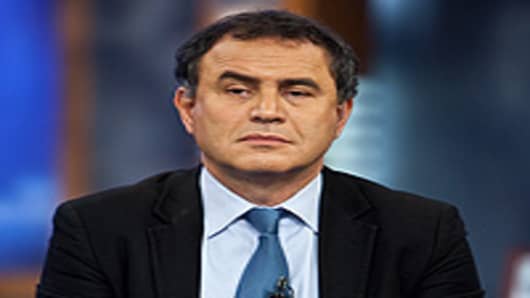The world's advanced economies are headed for a second recession, regardless of whether there is further chaos in Europe, noted economist Nouriel Roubini told CNBC on Tuesday.
Roubini — who correctly predicted the 2008 financial crisis, but has got some other bearish calls wrong — said his reading of recent data suggested the U.S., euro zone, and the U.K. are already on the verge of falling into a recession in the next quarter or two.
"The question is not whether or if there is going to be a double dip, but whether it's going to be mild or severe with another financial crisis," Roubini, head of Roubini Global Economics, told CNBC on the sidelines of the World Knowledge Forum in Seoul. "The answer on that depends on the euro zone."
According to Roubini, a disorderly situation in Europe caused by a sovereign debtdefault, a banking crisis, or an exit of one of the members from the euro zone, would be a shock more severe than the collapse of Lehman Brothers in the U.S.. He added that Europe had to get its act together and "do the right thing" before the Group of 20 nations (G20) meeting in Cannes in the first week of November.
Roubini believes that "the right thing" involves expanding the European Financial Stability Fund (EFSF)to around 2 trillion euros ($2.7 trillion) and creating a Europe-wide TARP program, which would help recapitalize the banks.
"You need an EFSF that is four times as large as the 440 (billion euros) to make sure that a bad equilibrium, and a self-fulfilling run on Italy and Spain doesn't occur," he said. "There's no plan for that, because politically even the first EFSF has not yet been approved, let alone to triple it or quadruple it."
In addition, Roubini said the European Central Bank needed to ease monetary policy to boost growth. The ECB last week kept interest rates unchanged at 1.5 percent, even as it announced a program to buy 40 billion euros ($54 billion) in covered bonds.
"The ECB made a mistake, they've not reversed it, they need a much weaker euro, that's unlikely to occur," Roubini said. "They need fiscal stimulus...If you have fiscal austerity in their periphery, all these things are necessary to restore economic growth."



